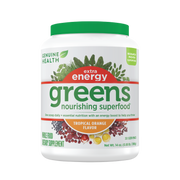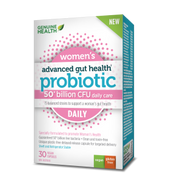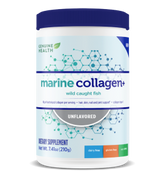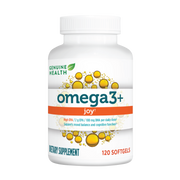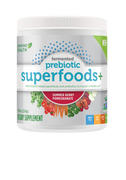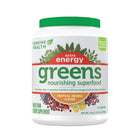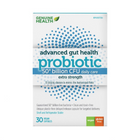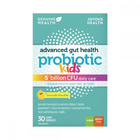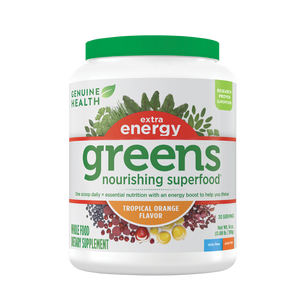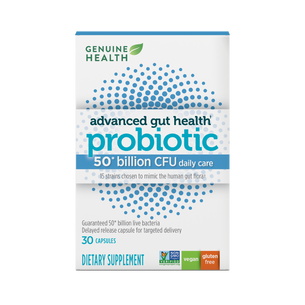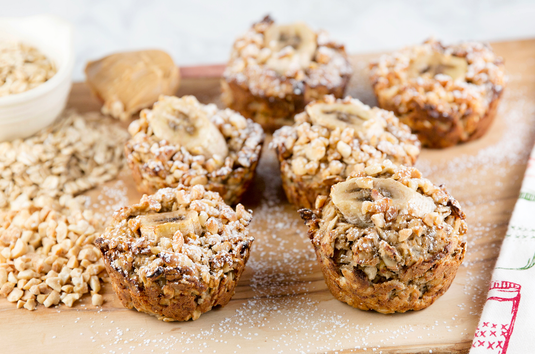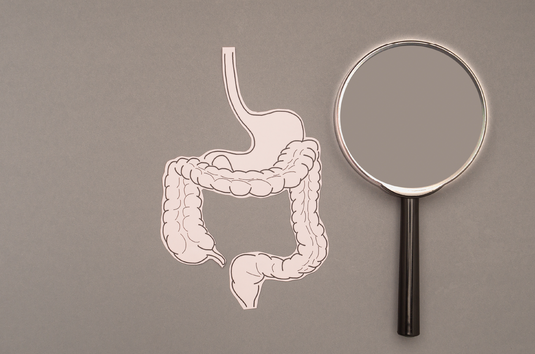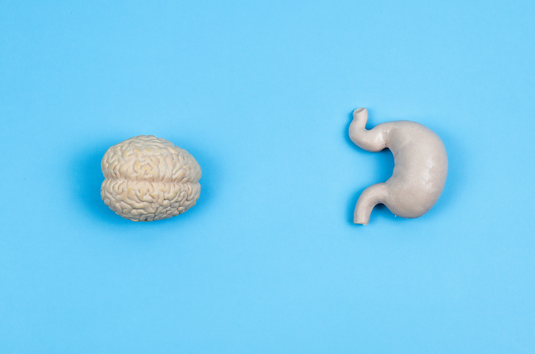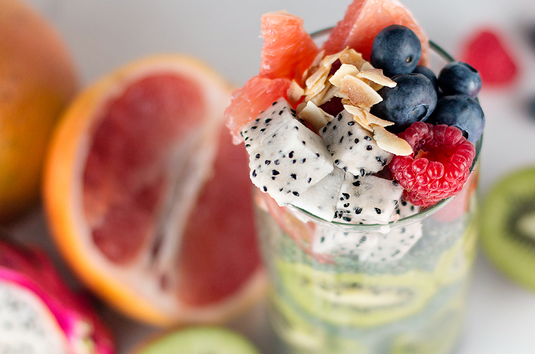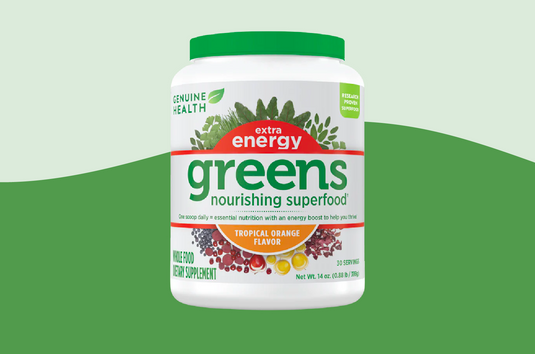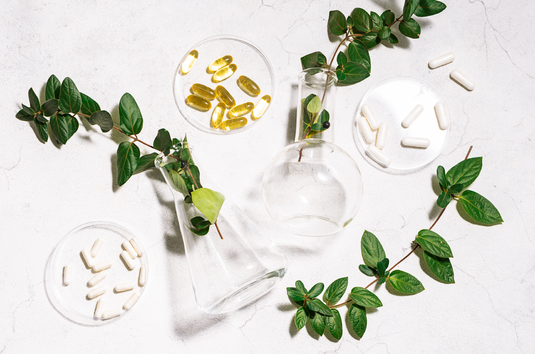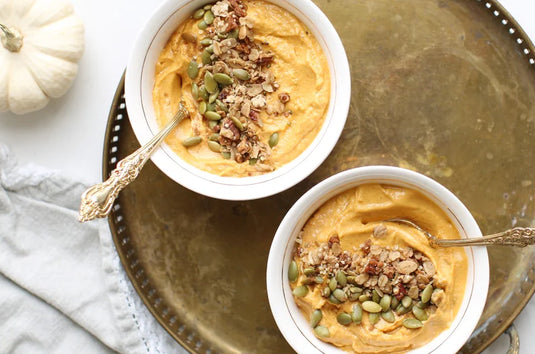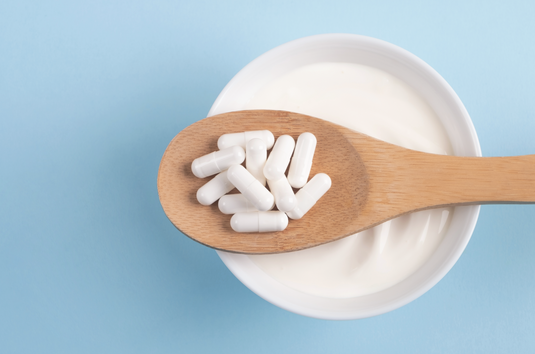Article
energy
gut health
immune system
immunity
microbiome
skin care
temp-Breakfast
temp-Greens
temp-Vegan
Want to Support Immunity? Look to Your Gut

For thousands of years we’ve relied on our microbes to help keep us happy and healthy. Unfortunately, it is no secret that much of our modern lifestyle has not been kind to these ancient partners. The consumption of nutrient-depleted diets - low in fiber and rich in processed foods - has imposed drastic changes on our vital microbial communities, the implications of which we’re just beginning to uncover!!
It is at the gut where we find our richest and most diverse communities, around 1000 different species and nearly countless strains! [1] Here our microbes work hand in hand with our immune cells, helping to identify threats and keep out foreign invaders, forming an integral part of our immune defense. As you can imagine this is an incredibly complex job, making it essential that we have the right balance of microbes to properly support our immune system.
No really, maybe the most exciting discovery of the past few decades comes around the gut-brain connection. It is now known that microbes in your gut can directly signal the brain through the vagus nerve; a key component of our parasympathetic nervous system that is in part responsible for the regulation of mood and immunity. This has led many experts to suggest that tending to our microbiome could be a highly successful strategy for reducing stress and improving mental outlook! [2]
Keeping all of this in mind, it should come as no surprise that stressful periods (physical or psychological) have been linked to lowered immune function, likely a result of changes to our microbiome. Luckily for us, when it comes to promoting a healthy gut ecology, we have powerful research-driven actions at our disposal. And as always, number one is diet.
What is the perfect diet?! This can quickly become a controversial topic, exasperated by the fact that it is almost certainly a question without an answer. But this does not mean we are condemned to a state of nutritional confusion or inaction!! By sticking to some basic principles, we can take significant steps towards drastically improving our overall wellbeing.
For one, we can all agree that a strong gut-focused strategy can be viewed as a dietary staple. And just like ourselves, our microbes have ferocious appetites and crave proper nutrition to flourish. Fortunately, the research here is clear: eat a variety of colorful plant foods. Not only are these foods rich in vitamins, minerals, and dietary fiber, they also contain abundant levels of plant nutrients (phytonutrients) also referred to “prebiotics”; quite literally fuel for your gut!
Increasing your intake of dietary fiber and phytonutrient rich foods can help encourage the growth of good bugs and strengthen your gut lining. To take just one example, researchers have recently found that the phytonutrients naturally found in cranberries may increase the numbers of akkermansia muciniphila, a species of highly beneficial microbe that is believed to help fortify our critical gut lining! [3]
But putting diet aside, there are many other key factors that can impact the health of your microbiome. Are you getting regular exercise? Are you taking time to get outdoors and connect with nature? Are you properly managing your stress? All of these are proven ways in which we can help maintain our essential microbial diversity.
And what about supplements? While diet should always come first, choosing the right supplements can give yourself a convenient nutritional boost. For one, we know that reintroducing live beneficial microbes (probiotics) into our diets carries huge nutritional potential. While this can be done through fermented foods (such as yogurt, kimchi, or sauerkraut), it is important to keep in mind that these foods typically carry modest amounts of these desirable microbes. Taking a daily probiotic can be a great way to boost your overall intake!
In fact, taking a daily probiotic has been shown to both reduce sick days and improve mental outlook [4]. This should come as no surprise, given all we know about the close relationship between the brain, immunity, and our microbiome.
But with so many options on the market, it can sometimes be difficult to choose. What exactly should you look for in a probiotic? First, look for a probiotic that features a balance of beneficial strains. Remember, your microbiome is home to over 1000 unique species, so choosing a probiotic that contains only one or two is likely not the best approach. In fact, 75% of research in this area has been conducted on multi-strain formulas.
Second, make sure that your probiotic guarantees the delivery of live bacteria. Often, poor manufacturing processes or quality control can lead to a significant reduction of live bacteria by the time they reach your gut, significantly blunting their potential. These are important factors to keep in mind when choosing your next probiotic!
As we enter into another fall season, take proactive steps to support your immune system. Supporting your microbiome with a quality probiotic like advanced gut health probiotic is a great place to begin.
Sources:
It is at the gut where we find our richest and most diverse communities, around 1000 different species and nearly countless strains! [1] Here our microbes work hand in hand with our immune cells, helping to identify threats and keep out foreign invaders, forming an integral part of our immune defense. As you can imagine this is an incredibly complex job, making it essential that we have the right balance of microbes to properly support our immune system.
No really, maybe the most exciting discovery of the past few decades comes around the gut-brain connection. It is now known that microbes in your gut can directly signal the brain through the vagus nerve; a key component of our parasympathetic nervous system that is in part responsible for the regulation of mood and immunity. This has led many experts to suggest that tending to our microbiome could be a highly successful strategy for reducing stress and improving mental outlook! [2]
Keeping all of this in mind, it should come as no surprise that stressful periods (physical or psychological) have been linked to lowered immune function, likely a result of changes to our microbiome. Luckily for us, when it comes to promoting a healthy gut ecology, we have powerful research-driven actions at our disposal. And as always, number one is diet.
What is the perfect diet?! This can quickly become a controversial topic, exasperated by the fact that it is almost certainly a question without an answer. But this does not mean we are condemned to a state of nutritional confusion or inaction!! By sticking to some basic principles, we can take significant steps towards drastically improving our overall wellbeing.
For one, we can all agree that a strong gut-focused strategy can be viewed as a dietary staple. And just like ourselves, our microbes have ferocious appetites and crave proper nutrition to flourish. Fortunately, the research here is clear: eat a variety of colorful plant foods. Not only are these foods rich in vitamins, minerals, and dietary fiber, they also contain abundant levels of plant nutrients (phytonutrients) also referred to “prebiotics”; quite literally fuel for your gut!
Increasing your intake of dietary fiber and phytonutrient rich foods can help encourage the growth of good bugs and strengthen your gut lining. To take just one example, researchers have recently found that the phytonutrients naturally found in cranberries may increase the numbers of akkermansia muciniphila, a species of highly beneficial microbe that is believed to help fortify our critical gut lining! [3]
But putting diet aside, there are many other key factors that can impact the health of your microbiome. Are you getting regular exercise? Are you taking time to get outdoors and connect with nature? Are you properly managing your stress? All of these are proven ways in which we can help maintain our essential microbial diversity.
And what about supplements? While diet should always come first, choosing the right supplements can give yourself a convenient nutritional boost. For one, we know that reintroducing live beneficial microbes (probiotics) into our diets carries huge nutritional potential. While this can be done through fermented foods (such as yogurt, kimchi, or sauerkraut), it is important to keep in mind that these foods typically carry modest amounts of these desirable microbes. Taking a daily probiotic can be a great way to boost your overall intake!
In fact, taking a daily probiotic has been shown to both reduce sick days and improve mental outlook [4]. This should come as no surprise, given all we know about the close relationship between the brain, immunity, and our microbiome.
But with so many options on the market, it can sometimes be difficult to choose. What exactly should you look for in a probiotic? First, look for a probiotic that features a balance of beneficial strains. Remember, your microbiome is home to over 1000 unique species, so choosing a probiotic that contains only one or two is likely not the best approach. In fact, 75% of research in this area has been conducted on multi-strain formulas.
Second, make sure that your probiotic guarantees the delivery of live bacteria. Often, poor manufacturing processes or quality control can lead to a significant reduction of live bacteria by the time they reach your gut, significantly blunting their potential. These are important factors to keep in mind when choosing your next probiotic!
As we enter into another fall season, take proactive steps to support your immune system. Supporting your microbiome with a quality probiotic like advanced gut health probiotic is a great place to begin.
Sources:



